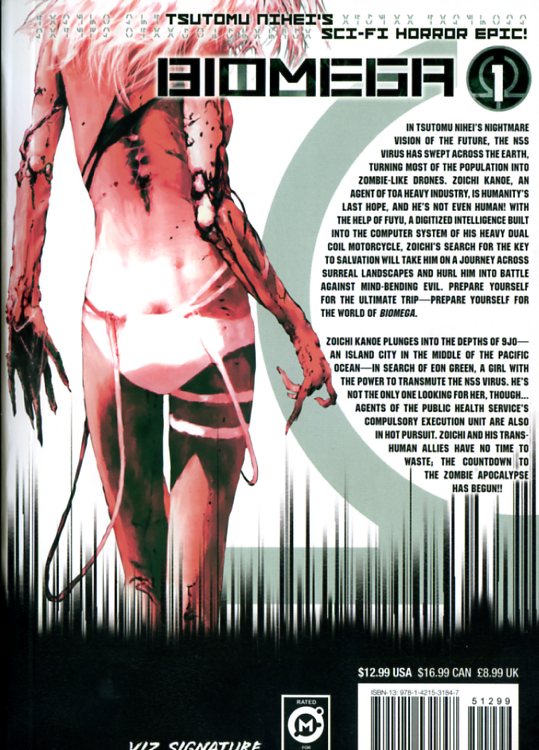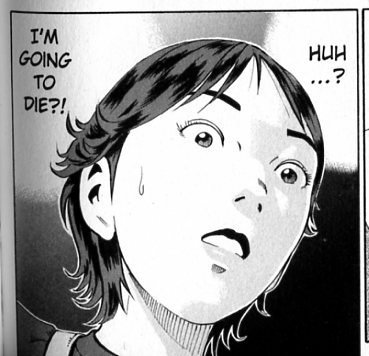This first appeared in The Comics Journal.
________________
Biomega #1; Tsutomo Nihei; Viz; 220 pp., $12.99; B&W, Softcover; ISBN: 1-4215-3184-4 & Ikigami #4; Motoro Mase; Viz; 240 pp., $12,99; B&W, Softcover; ISBN: 978-1421526812
Futurist apocalyptic dystopic manga! Guns! Out-of-control state power! Evil vaccinations! Morally torn government functionaries! Artificial humans! Intelligent bears! Homicidal schoolteachers! Doesn’t that get the blood pumping?!
Maybe?
Biomega #1 — There’s a guy on a motorcycle and he works for a giant industrial conglomerate, which is good because they can make artificial humans just like him to fight the zombie apocalypse put in place by the evil government agency. You could read nutty John Bircher politics into that if you wanted, but luckily the aforementioned zombie virus has actually settled in and eaten this manga’s brain, so if there was an evil John Bircher about, he/she is now dribbling brain bits out of his dislocated jaw, making a huge-disgusting mess on the inside of his white hood, thank you very much — and ew. Hey, shoot him in the face why don’t you? That’s what we’re here to see. Also — we’ve got a zombie orbiting earth! That’s a new twist, huh? Look at the pretty apocalyptic art showing nothing of any particular consequence. I especially appreciate the sexy zombie ass-crack on the back cover, because apparently part of having your brain eaten when you’re a zombie and a hot woman is that you cease being able to pull your underwear up all the way.
Ikigami #4 — So that was nonsense John Bircher paranoia; this is serious John Bircher paranoia. The future is not artificial humans killing zombies; it’s the evil government engaged in a vaccination conspiracy, so that one out of every 999 citizens die when they’re 25. Or is it that one out of every 25 citizens die when they’re 999? Anyway, they get 24-hours notice that they’re going to fall over so they can seize the day like Robin Williams … and hey, by coincidence, one of the guys who kicks it in this volume is a conscientious schoolteacher. For a moment there I thought we were going to get a moral about how educators suck and should all be killed, which I would support — but no, the teacher remains compassionate and caring even when he turns into a homicidal loony, and the double-twist ironic moral is that I really do believe that children are our future, teach them well, and let them lead the way. Let them show all the beauty they possess inside, already. Then the next one who gets it is a young mother whose husband cares too much about cars. But he gives up the car when he realizes his wife is going to die. It’s all about learning life-lessons while looking at soulful adequately drawn cartoony close-ups. Eventually I suppose the government functionary who tells people they are going to die will question the morality of his actions, thereby receiving a higher and higher percentage of the book’s aforementioned soulful close-ups. This is good, because soulful close-ups help you grow as a person.
I learned so much from these manga. Things like, “don’t trust the government.” “Melodrama must have recognizable characters, but straight action is drawn better.” And, most importantly, “The Japanese, too, are capable of derivative, fifth-drawer, dystopic science-fiction.” It really is a small world, after all.


